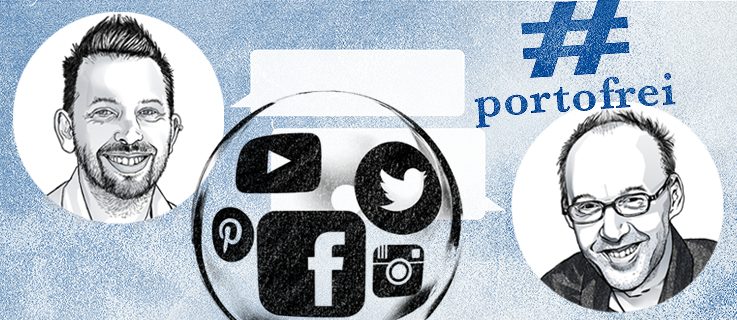Once upon a time there were hopes that the Internet would democratize social discourse – but today the talk is mainly about fake news and filter bubbles whenever the subject turns to the question of how digitization influences politics. What can journalists do to regain the trust that has been lost? And what can ordinary people do to engage to a greater extent in discussions with one another again? These questions were debated here by the journalists Robert Misik from Austria and Antony Loewenstein from Australia. Their digital correspondence was postage-free – and open to all. You can still give your comments in the comments field on this page, or on Facebook, Twitter and Instagram using the hashtag #freepost. Geraldine de Bastion moderated the debate.
 Photo (detail): Roger von Heereman / Konnektiv
Photo (detail): Roger von Heereman / Konnektiv
Geraldine de Bastion: 4 December 2009 marked a paradigm shift on the Internet, as it was on this day that Google began creating personal profiles for every user and individually filtering search results. Internet activist Eli Pariser described this as the start of an “era of personalization”, coining the term “filter bubble” for it in his book
Filter Bubble: What the Internet Is Hiding from You.
This growing individualization is evident when we are presented with personalized advertising – and indeed when we use supposedly neutral tools such as search engines to navigate our way through the information medium number one; tools we have to use because otherwise the Internet would be simply impenetrable.
“Customized services” are omnipresent. Rather than being an encyclopaedia of world events, the Internet is more reminiscent of a special interest paper. In our social media profiles too, which should really be connecting rather than isolating us, we find ourselves faced initially with a kind of “one-way mirror”, as Eli Pariser describes it in his book. By watching what we click, algorithms learn more and more about us, and we get increasingly entangled in our own personal bias online: when surfing the web, users only see stuff that matches their profile, their worldviews and their convictions.
Some critics of this theory claim that the filter bubble is not a purely digital phenomenon, and that it is intrinsic in all of us from the start. We view the world through our own particular glasses, surround ourselves with like-minded people and read only things that confirm our own opinions.
So how do you perceive your filter bubble, online and offline? And do filter bubbles in fact exist at all?
 Photo: Helena Wimmer
Photo: Helena Wimmer
Robert Misik: Of course filter bubbles exist. That is not something that requires any discussion – it is rather a question of interpretation: do the filter bubbles in digital communication enclose and confine us to a greater extent than would otherwise be the case? If this is the question to be addressed, the situation is already more complicated. Modern societies are comprised of a large number of subgroups that differ from one another in terms of their ways of life, political persuasions, personal styles and so on. We have inner city dwellers, working class urban districts, middle classes in the suburbs, the super-rich in their favoured areas, big cities, small towns, villages … The people who live in these various sub-communities also have little contact with those in other sub-communities in real life – and when they do have contact, it tends rather to be on a superficial level.
Digital communication, be it in social networks, forums or other online media, reinforces this logic on the one hand while breaking with it on the other. Reinforced in the sense that, assuming we fit into the patchwork of a community with a particular set of opinions, we will find ourselves inundated with ever more messages that reinforce this community’s prevailing opinions. This entrenches our views and gives us tunnel vision. Yet that is of course only one side of the truth. We can see the opinions of others on a daily basis in the social media and forums – where we are confronted with attitudes that we might otherwise not even notice. That is something that is often overlooked when we talk about filter bubbles.
 Photo: Reuben Brand
Antony Loewenstein: A key deficiency of modern society is lack of empathy for the underprivileged
Photo: Reuben Brand
Antony Loewenstein: A key deficiency of modern society is lack of empathy for the underprivileged, a disease caused by experiencing our daily lives in a bubble.
Too often what we read and don’t see online and what we hear and experience in our real lives reduces our ability to relate to others who look or sound different to us. It’s tempting to hate refugees coming from the Middle East or Africa if you feel economic and racial insecurity and are told by your trusted newspaper, TV host or friend that you should fear the “other” because they’re worsening your personal situation. Resisting this impulse requires widening what you consume and consider on a daily basis. This tendency existed before the rise of the internet and social media but it’s now easier to find your own tribe online.
I’ve experienced this in my own work. When I visit Gaza as a journalist and tell people that I don’t feel threatened as a Jew by locals or the Islamist government, the instant reaction is often suspicion because the media has fed a line for decades that Palestinians are inherently violent and Muslims want to kill all Jews. This lie can only be challenged by constantly explaining the truth and showing the fallacy of the position.
The rise of Donald Trump, Brexit and rampant nationalism in Europe, the US and Australia has made me spend even more time reading, listening and reporting on the movements that caused these political earthquakes. Contemptuously dismissing Trump won’t make his supporters disappear. I don’t personally know any Trump or Brexit voters, and nor do I associate with white nationalists who loathe Islam, but I’m drawn to exploring why many people are.
 Photo (detail): Roger von Heereman / Konnektiv
Photo (detail): Roger von Heereman / Konnektiv
Geraldine de Bastion: In recent months I have often tried to engage with friends of friends and followers of followers outside my “filter bubble”. For the most part, such discourse would end after a fairly short time when I found myself bombarded with slogans such as “Make America great again”. Arguments based on facts seemed mainly to fall on deaf ears.
For “Manipuliert”
(i.e. Manipulated), a report that was broadcast in May, the columnist Sascha Lobo also left the comfort zone of his own filter bubble in an attempt to understand how we are influenced by social media. He found that they take advantage of distortions in the way we perceive and remember things, explaining that the bandwagon effect and “hyper-emotionalization” are particularly pronounced on the Internet: social media are driven by emotions. And this being the case, indignant and outraged comments are disseminated far more widely and quickly.
He recommends that platforms be used in a more carefully considered and conscious manner. The more we know about the way technologies function, the less we will be manipulated by them.
#ichbinhier does the same as we as individuals do, but on a collective basis. This Facebook group takes steps to combat hate-filled comments and smear campaigns on the Internet, writing and liking factual, objective and respectful comments so as to raise the visibility of such attitudes online. Their aim is to improve the climate in which discussions are conducted on Facebook.
What has been your experience: how can we seek and conduct constructive discourse outside the filter bubble?
 Photo: Helena Wimmer
Photo: Helena Wimmer
Robert Misik: To be honest, I do not really have the time to seek out and engage in online discussions outside my filter bubble. After all, it takes a while at first to persuade people to abandon the aggressive and defensive stance that they typically adopt online and begin a dialogue based on mutual trust – and then you have to spend half the day sending messages back and forth.
However, I also know from experience that it is simply far too difficult to have online discussions with people beyond the boundaries of one’s own milieu or opinion communities. Web-based communication triggers aggression, rudeness, a delight in polemics and entrenched views, and does nothing to trigger the contrary – that is to say a desire for politeness and courtesy or the willingness to view someone as potentially likeable rather than just the writer of a text (all of the things that are taken for granted in our “normal” offline dealings with others). Generally speaking, we can say that all of us are perfectly nice offline, but online we are monsters. This is partly to do with the fact that we not only speak
with people online, but also
in front of people, in that there are always other people reading the posts. This in itself transforms any dialogue into something of a show fight.
However, I am well aware that it is also possible to have an impact in social networks with “positive” communication. Admittedly, it is much easier to attract attention in social networks if you adopt negativist, permanently indignant and polemic attitudes; at the same time it is also true that many people are sick of all of this, so positive communication can also have a “contagious effect”.
 Photo: Reuben Brand
Antony Loewenstein: Living and working outside our own filter bubbles
Photo: Reuben Brand
Antony Loewenstein: Living and working outside our own filter bubbles requires us to first acknowledge that our own positions are inherently biased and should be challenged. I proudly call myself a liberal and yet I constantly feel disillusioned with the superiority expressed by ‘my side’ in political debates.
Take the 2003 Iraq war, arguably the most consequential conflict of the 21st century. Countless journalists, commentators and supposedly serious politicians around the world backed the illegal invasion and occupation of Iraq, including many progressively-minded people. They were catastrophically wrong and yet virtually none of these individuals have paid any political or career price for their hubris. Many of the same faces are now advocating the bombing of Syria, Libya, Iraq and Afghanistan. What this seminal experience taught me was that we need to question our own ‘side’ first, online and in person, while also disputing the mistruths and bigotry of our opponents.
Truth-telling can be powerful. If Wikileaks had existed in 2003, and it published the conversations of George W. Bush and Tony Blair conspiring and lying about the Iraq war, would the war have been stopped before it even begin?
The election of Donald Trump fills me with dread but I’m not suddenly more concerned about ‘fake news’ today than 15 years ago. Social media has undeniably fuelled our ability to feel connected and insulated from views we don’t want to hear but I’m far more worried about group think when it comes to questions of war and peace and the millions of lives that have been lost in the name of national security and fighting terrorism since 9/11.
We should aim to conduct constructive and insightful conversations with everybody online, personal abuse should be avoided, but it’s the height of arrogance to believe that only we have facts on our side and others, like Trump, Brexit or Marine Le Pen supporters, are all delusional.
 Photo (detail): Roger von Heereman / Konnektiv
Photo (detail): Roger von Heereman / Konnektiv
Geraldine de Bastion: We are confronted online with Facebook algorithms and the strident opinions we hear from the right-wing echo chambers. Nonetheless, as Mr Misik pointed out, not everyone has the time and energy to engage in a pluralistic exchange of opinion. Do we need new tools to secure a digital agora?
See this week’s post of Geraldine de Bastion – in the form of a video statement:
 Photo: Helena Wimmer
Photo: Helena Wimmer
Robert Misik: I’d like to start by raising the question of whether technology in fact sets the tone itself. If we sort of have the feeling that some things in these online debates are not going quite the way they should, is that down to the people taking part in them? Or is it because of the time that is available? Or is it down to the technology itself?
See this week’s post of Robert Misik – in the form of a video statement:
 Photo: Reuben Brand
Antony Loewenstein: Trying to reach across the aisle to reach people with different political persuasions is vital.
Photo: Reuben Brand
Antony Loewenstein: Trying to reach across the aisle to reach people with different political persuasions is vital. I would argue, the only way to do that effectively is to meet people in person and also online.
See this week’s post of Antony Loewenstein – in the form of a video statement:
 Photo (detail): Roger von Heereman / Konnektiv
Photo (detail): Roger von Heereman / Konnektiv
Geraldine de Bastion: I agree with Antony: the new journalistic initiatives that have emerged in recent years, based on uncovering the truth through investigative journalism, offer promising potential for pointing the way forward – such as
Correctiv in Germany and indeed
The Intercept that Antony mentioned in his video contribution.
This is also the approach followed by Eliott Higgins’
Bellingcat: a research network that uses crowd-sourced information that is available online to explore for example the deployment of weapons in the Syrian civil war. The team analyses online photos and videos in an attempt to reveal the truth, where others merely speculate. This could be a valid approach, and a skill that I would like to see not only in specialists: the ability to question information and view it in context rather than simply taking it at face value.
How can we make sure that more Internet users develop this skill? One important way is of course via education, which results in improved media competence.
However, I also agree with Antony when he says that there is another important aspect besides all the justified concerns about filter bubbles in social media: namely the fact that we see a clash of opinions here that would hardly ever meet in real life.
In her Ted Talk, Megan Phelps-Roper explains how she was raised in the Westboro Baptist Church and spent her childhood preaching against homosexuals, Jews and others who were defined by the Westboro Baptist Church as evil. It was only through Twitter that she gradually learnt to understand other viewpoints and to critically reflect upon her faith.
I too scroll daily through Twitter conversations and am sometimes shocked by the views of others, though at the same time I am happy at least to be aware of them in the first place. This also shows how various platforms and the way they are designed influence such discourses in different ways: while I rarely encounter people from other political spectra on Facebook, this regularly happens on Twitter.
I believe that we need not only media structures, that is to say platforms, which foster discourse, but also the ability to use these and contribute our opinions. Robert is right to be sceptical about the way these approaches are implemented. But perhaps we do need the following after all:
1. more funding for open platforms and more pressure on platforms like Facebook,
2. more funding for new journalistic approaches and
3. proper media education at schools.
What would your demands be?
 Photo: Helena Wimmer
Photo: Helena Wimmer
Robert Misik: Of course I agree with much of what Antony has said, but would nonetheless like to raise a few potential objections or examples of counterevidence that we should not lose sight of.
Naturally it is great when dissident groups, the dissatisfied and other people establish their own media, and it is even better when these media succeed in attracting a relevant number of readers. Yet precisely in the context of our topic we should not forget that these tend only to be media that reach a small readership, and that these readers are of course generally those who were already looking for a medium of this kind.
However, what there is less and less of is mass media in the positive sense of the word, that is to say media with a broad and diverse readership capable of connecting large parts of a society, ideally by providing us with a certain common basis of information and raising particular issues.
It seems to me that there is a bigger problem, however; one that contributes much more to a “uniform culture” in the media than the energy sector adverts that Antony was talking about: people tend to forget how many invisible obstacles there are to becoming a journalist in the first place. My impression is that these obstacles are becoming higher in many countries. Journalistic training is expensive, it takes a long time to enter the profession, and in many countries one has to be prepared to embark on long and poorly paid – or indeed unpaid – internships. Who can afford that these days? Kids from the upper middle classes, that’s who. And consequently, the majority of those who get given a chance at all are then young, white and rich. This leads to a monoculture of those who are put in a position to write the reports that accompany the reality of our lives. They may well be perfectly nice people with the best of intentions, but obviously they have their own specific perspective, one that is not the same as that of an immigrant child who grew up on benefits.
For me, all this means that there is no one right solution, no “silver bullet” capable of resolving these problems.
We need good scholarships for young journalists, affirmative action, affordable housing in big cities (where media tend to be clustered), and no doubt we also need public funding models that not only allow large established media to maintain their quality standards but also put new counter-cultural media in a position to develop innovative journalism – without this entailing any interventions in content. We need smart solutions, either for new social media or to better utilize the existing social media, and we need this to be done in a way that will benefit us all, not only Mr Zuckerberg. And probably thousands of other important ideas as well.
 Photo: Reuben Brand
Antony Loewenstein: We are drowning in public relations. Journalism is suffering.
Photo: Reuben Brand
Antony Loewenstein: We are drowning in public relations. Journalism is suffering. According to a recent study in the US, 15 years ago there were two PR people for every reporter in the nation. Today there are 4.8 PR people for every reporter. The result is that the general public is too often bombarded with press releases as “news” because there are too few journalists to analyse and investigate current events.
One way to address this worrying shift is for greater public funding into a wide range of journalistic endeavours but government-sponsored press isn’t the only solution. Escaping our filter bubbles must begin at a young age.
Universities and schools, starting at kindergarten, should emphasize media literacy and stress the importance of accountable and adversarial journalism. A healthy mantra to be repeated time and again is the famous expression by journalist Claud Cockburn: “Never believe anything until it's officially denied.”
Scepticism of all government and business claims is a healthy way to assess the news of the day. Don’t simply trust journalists because they’re in positions of privilege; they should earn it by producing work that enhances our understanding of society and brings empathy to the silenced or forgotten.
Despite the proliferation of social media in the last decade, personal contact with people is arguably still far more powerful in changing minds than re-tweeting a thought or sharing a Facebook post. Talk to people with differing views, attend talks with writers and politicians with whom you vehemently disagree and spend less time online.
Finally, some tips for healthy living: enjoy the sun, read a book, have a meal with a friend and don’t always Instagram what food you’re eating.
 Photo (detail): Roger von Heereman / Konnektiv
Geraldine de Bastion: Over the past four weeks we have been discussing the subject of filter bubbles.
Photo (detail): Roger von Heereman / Konnektiv
Geraldine de Bastion: Over the past four weeks we have been discussing the subject of filter bubbles. Among other things, we have defined the term and explored technical structures. We have talked about how echo chambers function and about our individual responsibility to step outside them, about the possibility of using social media to break out of the “offline filter bubble”, and about the opportunities offered by new models of journalism.
Unlike our previous debate on the subject of home/homeland, our discussion this time has unfortunately not moved very far out of its own filter bubble. Although Facebook statistics show for example that Robert Misik’s video entry was watched by around a thousand people, this did not trigger any discussion on social media. The only reactions related to the discussion participants, not to the content of our discussion.
I hope nonetheless that the discussion contributions will be used as a reference for future debates – if only on account of the concrete and important demands and suggestions that were expressed – and above all that you will be keen to take part in the upcoming discussion, either in the comments, on Twitter or on Facebook. Next time we will be talking about values such as democracy and what they mean for each of us. Join in the discussion, which will begin in mid-September!
